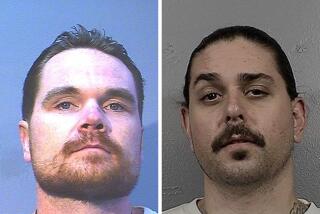California killer faces Virginia execution
- Share via
Reporting from Washington — For the first time in nearly a decade, a California murderer who was sentenced to death is facing execution - but in Virginia.
Alfredo Prieto, a serial rapist and killer, was convicted of three murders in Southern California and northern Virginia and has been identified as the prime suspect in six more.
He is due to be put to death in two weeks at a state prison in Jarratt, Va.
“At this time, we are not aware of any litigation by Mr. Prieto challenging his Virginia convictions or sentence,” said Michael Kelly, a spokesman for the Virginia attorney general. “The commonwealth is preparing to carry out the sentence on Oct. 1.”
Prieto, 49, a native of El Salvador, moved with his family to the Los Angeles area when he was a teenager. He became a member of the Pomona Northside gang.
In 1990, he was arrested, charged and convicted of raping and murdering a 15-year-old girl in a field near Ontario.
Prieto and two other men had kidnapped and assaulted three women, two of whom survived stabbings and testified against Prieto. A jury sentenced him to death.
Prosecutors opted not to pursue further charges even though they had DNA and ballistics evidence that made Prieto the prime suspect in four murders and two rapes near Riverside.
A federal judge in California put a moratorium on executions in 2006 because of doubts about the drugs used in lethal injections.
Prieto languished on California’s death row for more than a decade while his appeals churned through the courts.
But when his DNA was entered into a national database in 2005, Virginia authorities said it matched evidence collected from crime scenes of several unsolved rapes and homicides.
In one case, two 22-year-old women disappeared after they left a holiday party at a Washington restaurant in December 1988. Their bodies were found in a field off the highway that leads to Dulles International Airport.
One had been shot in the back, and the other had been raped and killed. The DNA test on the sample taken from the rape victim’s body pointed to Prieto.
DNA also identified Prieto as the suspect who raped and shot a young woman in Arlington, Va., earlier that year. A ballistic test separately linked him to the shooting death of a 27-year-old man in the fall of 1989, prosecutors said.
Police theorized Prieto fled back to California after his suspected crime rampage in northern Virginia.
In 2005, in response to a request from prosecutors, California authorities agreed to send Prieto back to Virginia to stand trial for two homicides in Fairfax County.
The county’s chief prosecutor said he pursued murder charges against Prieto “because he’ll never get the death penalty in California. I think it was time to bring him to justice for his horrible crimes.”
Prieto’s first prosecution in Virginia ended in mistrial when a single juror refused to deliberate.
But in a retrial, Prieto was convicted of murdering the young couple near Dulles airport, and in 2010 he was sentenced to die. The state Supreme Court upheld his conviction and sentence, and the U.S. 4th Circuit Court of Appeals rejected his appeals in May.
Prieto launched his own lawsuit contending that it was cruel and unusual punishment to hold him in solitary confinement. An attorney in Richmond said he had filed a motion seeking to stop his execution so his appeals can proceed.
The two states could not differ more on carrying out death sentences.
California has 747 inmates condemned to die but has carried out just 13 executions in the last 40 years, and none since 2006.
By contrast, Virginia has only eight inmates on death row but has carried out 110 executions since 1976.
When the “Beltway sniper” was arrested for 10 killings in the Washington area in 2002, federal authorities opted to send him to Virginia for prosecution even though most of the shootings took place in suburban Maryland.
John Allen Muhammad was convicted in 2003 and executed in Virginia six years later.
Kent Scheidegger, a lawyer for the Criminal Justice Legal Foundation in Sacramento and a supporter of the death penalty, says the difference in the two states can be explained by judges, not prosecutors and juries.
“It’s the willingness of the judges to work through the appeals and to get it done,” he said.
Twitter: @DavidGSavage
ALSO:
California now under pressure to propose lethal injection method
Court delays execution of Oklahoma man who claims innocence in 1997 killing
Supreme Court dissenters signal historic challenge to death penalty
More to Read
Sign up for Essential California
The most important California stories and recommendations in your inbox every morning.
You may occasionally receive promotional content from the Los Angeles Times.











